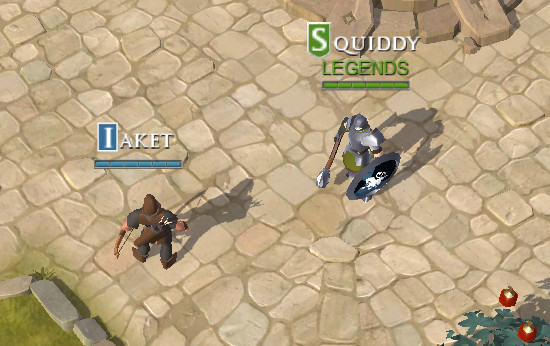In our last post talking about Albion Online coming to Steam, we talked about how odd it was that existing owners weren't getting Steam keys. The Albion team emailed us this morning to link us to some new information.

They sent us a link to this forum post from the Game Director, who essentially says that Albion's funding seems largely thanks to people buying gold and subscriptions to the Premium account in-game. When the game is on Steam, they're claiming this micro-transaction model is then forced to go through Valve using the Steam Wallet, so Valve take a cut:
As some of you may know, when a game is launched on Steam, payment of microtransactions (in our case gold purchases and subscriptions) have to be handled via Steam wallet.
Valve taking a cut of this obviously eats quite a large portion of their funding, so moving thousands of players over to a model where they get less funding obviously makes no business sense. It's understandable then why they're not giving out Steam keys, even if it's not great for existing owners who want all their games in one place, it's a very business-orientated approach to it without giving players an option. Understandably some players still aren't happy, since there's many games on Steam with micro-transactions which have no problem allowing players to link their accounts.
We've never heard before that micro-transactions are forced through Valve's systems, but it wouldn't surprise me. I've asked both the developer and Valve for clarification on this, as surprisingly no developer has ever told us this and trying to find information myself turned up nothing to say so.
Update—Seems the Albion developer may be correct going by this developer page, which states "For any in-game purchases, you'll need to use the microtransaction API so Steam customers can only make purchases from the Steam Wallet.". However, there's also this developer page which says the opposite "Steam places no restrictions on what you sell or how you sell it nor does it preclude the use of whatever other mechanisms your game has for selling items.". It might just be a case of poor wording on Valve's part, leading to developer confusion.
Update 2—I spoke to Valve myself and this is correct. Games on Steam do have to use Valve's API and use the Steam Wallet:
If you obtain/launch it from Steam, yes. A Steam user that downloaded Albion Online through Steam should only be offered Steam Wallet as a payment option for in-game items/currency, but that doesn't mean that they need to drop all other payment options just because the game is available on Steam. Someone that is playing the game through their own platform could still be offered direct payment.
If you look at games that are available on more than one PC platform, it's common practice to have different payment options depending on the version you get.
In the end, if you want a game on a specific platform, don't buy it elsewhere. Devs and publishers are under no obligation to gift you access to the game elsewhere, especially with key reselling still being a big thing.
Steam places no restrictions on what you sell or how you sell it nor does it preclude the use of whatever other mechanisms your game has for selling items.Doesn't seem so clear to me…
Quoting: tick[link](https://partner.steamgames.com/doc/features/microtransactions/implementation)The directly contradicts the other page I linked, it's possible one is outdated.
Steam places no restrictions on what you sell or how you sell it nor does it preclude the use of whatever other mechanisms your game has for selling items.Doesn't seem so clear to me…
For any in-game purchases, you'll need to use the microtransaction API so Steam customers can only make purchases from the Steam Wallet.can't it be read as : you will need to use the API if you want to let Steam customers use only the steam wallet.
Quoting: tickMaybe we should interpret differently :It does leave it a bit open to interpretation, which I think is the cause of the issue here.
For any in-game purchases, you'll need to use the microtransaction API so Steam customers can only make purchases from the Steam Wallet.can't it be read as : you will need to use the API if you want to let Steam customers use only the steam wallet.
The other page is rather clear though, that you're not forced to use it. Hopefully with my email linking the Albion developers to it, they can have a rethink possibly. They ideally need to speak to Valve themselves, to get a full answer.
Last edited by Liam Dawe on 29 Mar 2018 at 12:39 pm UTC
Quoting: nitroflowThe option would be opening a web page to their store front for micro transactions instead of relying on the steam API, unless the steam API is forced on them. At least with Shroud of the Avatar that seems the way it works, you go to it's website, buy what you want and then redeem the stuff in game after the fact.I'm surprised to hear that setup. I remember years ago when EA pulled out a bunch of their newer games because Steam wouldn't allow them to sell DLC within game. I think that today you still only see "Gold" or "GOTY" editions of EA games because DLC is complete and included in the game. Hearing what you say, perhaps opening a website is technically acceptable since it's not in-game...?
If it's true that Valve would take a cut on all in-game purchases (again, they're probably just not allowed), then that makes a lot of sense why several MMO's are either not in Steam or don't get into Steam until they're released for a couple years.
If you obtain/launch it from Steam, yes. A Steam user that downloaded Albion Online through Steam should only be offered Steam Wallet as a payment option for in-game items/currency, but that doesn't mean that they need to drop all other payment options just because the game is available on Steam. Someone that is playing the game through their own platform could still be offered direct payment.
If you look at games that are available on more than one PC platform, it's common practice to have different payment options depending on the version you get.
Quoting: 14This is because there aren't any in-game micro transactions, everything goes through their website, even the premium currency you can buy there is treated like actual in-game items.Quoting: nitroflowThe option would be opening a web page to their store front for micro transactions instead of relying on the steam API, unless the steam API is forced on them. At least with Shroud of the Avatar that seems the way it works, you go to it's website, buy what you want and then redeem the stuff in game after the fact.I'm surprised to hear that setup. I remember years ago when EA pulled out a bunch of their newer games because Steam wouldn't allow them to sell DLC within game. I think that today you still only see "Gold" or "GOTY" editions of EA games because DLC is complete and included in the game. Hearing what you say, perhaps opening a website is technically acceptable since it's not in-game...?
If it's true that Valve would take a cut on all in-game purchases (again, they're probably just not allowed), then that makes a lot of sense why several MMO's are either not in Steam or don't get into Steam until they're released for a couple years.
This also means it's possible to transfer your premium currency to others players.
Last edited by nitroflow on 30 Mar 2018 at 12:50 pm UTC
Treating in-game payments any different from the intial purchase would encourage a business model, where the game is given away for free, and income is generated solely by in-game purchases.
The most straight forward model would be a game that serves as a "free demo", with the "full version" being obtained by unlocking the content as microtransaction. Without forcing the use of Steam-Wallet for the Steam version, Valve wouldn't see a dime, while paying the infrastructure costs. The same already applies when customers purchase games outside of Steam, but use Steam for downloading and updating them, but so far this is apparently treated as a trade-off, speculating on a sufficient percentage of players purchasing the game directly through Steam.
The same concept is applied on other download platforms, specifically Google Play and the iOS Appstore. The latter is the strictest about it and forbids even links to out-of-app purchases – which makes sense, for the same reasons, but results in awful user experiences for content-reseller apps (eBooks, Video- and Music-Streaming). 30% of the purchase price might be more than 100% of the net-earnings, while having the customer pay extra for in-app purchases would make the feature pretty much useless.
Quoting: KlausThe logic behind forcing a cut of in-game payments is quite understandable really.Except this has been done before on steam, just search any F2P game and at most what you find for sale are starter packs, while the game's premium currency is bought through the game's own site.
Treating in-game payments any different from the intial purchase would encourage a business model, where the game is given away for free, and income is generated solely by in-game purchases.
The most straight forward model would be a game that serves as a "free demo", with the "full version" being obtained by unlocking the content as microtransaction. Without forcing the use of Steam-Wallet for the Steam version, Valve wouldn't see a dime, while paying the infrastructure costs. The same already applies when customers purchase games outside of Steam, but use Steam for downloading and updating them, but so far this is apparently treated as a trade-off, speculating on a sufficient percentage of players purchasing the game directly through Steam.
The same concept is applied on other download platforms, specifically Google Play and the iOS Appstore. The latter is the strictest about it and forbids even links to out-of-app purchases – which makes sense, for the same reasons, but results in awful user experiences for content-reseller apps (eBooks, Video- and Music-Streaming). 30% of the purchase price might be more than 100% of the net-earnings, while having the customer pay extra for in-app purchases would make the feature pretty much useless.
Last edited by nitroflow on 3 Apr 2018 at 2:01 pm UTC
Quoting: nitroflowGot a point there. In the past, it has also been done on iOS though. Then apple cracked down on Amazon over it.Quoting: KlausThe logic behind forcing a cut of in-game payments is quite understandable really.Except this has been done before on steam, just search any F2P game and at most what you find for sale are starter packs, while the game's premium currency is bought through the game's own site.
Treating in-game payments any different from the intial purchase would encourage a business model, where the game is given away for free, and income is generated solely by in-game purchases.
The most straight forward model would be a game that serves as a "free demo", with the "full version" being obtained by unlocking the content as microtransaction. Without forcing the use of Steam-Wallet for the Steam version, Valve wouldn't see a dime, while paying the infrastructure costs. The same already applies when customers purchase games outside of Steam, but use Steam for downloading and updating them, but so far this is apparently treated as a trade-off, speculating on a sufficient percentage of players purchasing the game directly through Steam.
The same concept is applied on other download platforms, specifically Google Play and the iOS Appstore. The latter is the strictest about it and forbids even links to out-of-app purchases – which makes sense, for the same reasons, but results in awful user experiences for content-reseller apps (eBooks, Video- and Music-Streaming). 30% of the purchase price might be more than 100% of the net-earnings, while having the customer pay extra for in-app purchases would make the feature pretty much useless.
We'd really need clarification here on whether Valve's handling has changed, or if it is a safety measure by the developers, who prefer to stay within the stated terms of the contract rather than trying to sidestep it.









 How to setup OpenMW for modern Morrowind on Linux / SteamOS and Steam Deck
How to setup OpenMW for modern Morrowind on Linux / SteamOS and Steam Deck How to install Hollow Knight: Silksong mods on Linux, SteamOS and Steam Deck
How to install Hollow Knight: Silksong mods on Linux, SteamOS and Steam Deck